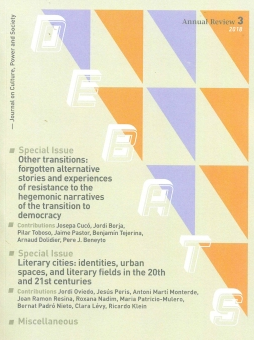Workers’ mobilisations during the Spanish democratic transition: discourse and representations of assemblyism (1976–1978)
Resum
The following work analyses trade union and journalistic discourses on the role played by worker’s assemblies during the Spanish transitional process with the aim of understanding how their mobilisation was subjugated and subordinated by political organisations and trade unions who were in opposition to democratisation. The worker’s assemblies were not anecdotal events, and the marginalisation of their meetings was partly the consequence of public discourses that delegitimised them. Moreover, these discourses contributed to the construction of a specific political culture which rejects worker ‘radicalism’. Thus, workers were asked to reject their own democratic structures and accept the monopoly of social representation by the trade unions.Descàrregues
Descàrregues
Publicades
Com citar
Número
Secció
Llicència
Sense perjudici del que disposa l'article 52 de la Llei 22/1987 d'11 de novembre de Propietat Intel·lectual, BOE del 17 de novembre de 1987, i conforme a aquest, els/les autors o autores cedeix/en a títol gratuït els seus drets d'edició, publicació, distribució i venda sobre l'article, per tal que siga publicat a Debats. Revista sobre cultura, poder i societat.
Debats. Revista de cultura, poder i societat es publica sota el sistema de llicències Creative Commons segons la modalitat “Reconeixement – NoComercial (by-nc): Es permet la generació d’obres derivades sempre que no se’n faça un ús comercial. Tampoc no es pot fer servir l’obra original amb finalitats comercials”.
Així, quan l’autor/a envia la seva col·laboració, accepta explícitament aquesta cessió de drets d’edició i de publicació. Igualment autoritza Debats. Revista de cultura, poder i societat la inclusió del seu treball en un fascicle de la revista perquè es puga distribuir i vendre.











